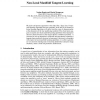Free Online Productivity Tools
i2Speak
i2Symbol
i2OCR
iTex2Img
iWeb2Print
iWeb2Shot
i2Type
iPdf2Split
iPdf2Merge
i2Bopomofo
i2Arabic
i2Style
i2Image
i2PDF
iLatex2Rtf
Sci2ools
91
Voted
NIPS
2004
2004
Non-Local Manifold Tangent Learning
We claim and present arguments to the effect that a large class of manifold learning algorithms that are essentially local and can be framed as kernel learning algorithms will suffer from the curse of dimensionality, at the dimension of the true underlying manifold. This observation suggests to explore non-local manifold learning algorithms which attempt to discover shared structure in the tangent planes at different positions. A criterion for such an algorithm is proposed and experiments estimating a tangent plane prediction function are presented, showing its advantages with respect to local manifold learning algorithms: it is able to generalize very far from training data (on learning handwritten character image rotations), where a local non-parametric method fails.
Kernel Learning Algorithms | Manifold Learning Algorithms | NIPS 2004 | NIPS 2007 | True Underlying Manifold |
Related Content
| Added | 31 Oct 2010 |
| Updated | 31 Oct 2010 |
| Type | Conference |
| Year | 2004 |
| Where | NIPS |
| Authors | Yoshua Bengio, Martin Monperrus |
Comments (0)

